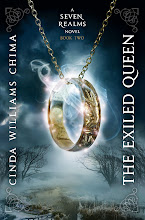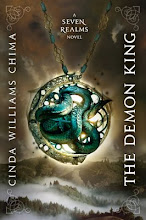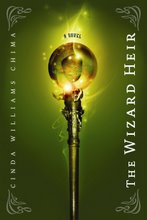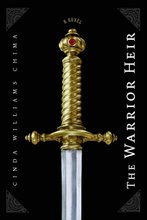“They want me to ‘Lexile the library,’” she said. “I’m fighting it.”
“Lexile the library? What’s that?” I said.
Turns out Lexile is a scoring system used to evaluate the reading difficulty of books based on word frequency and sentence length. The idea is that if you know a book’s reading level, and you know the reading ability of a student, you can direct them to appropriate books. Nothing wrong with that, right?
“They want me to paste the Lexile rating on the spine of each book,” my friend said. “Then the language arts teacher sends students in to check out books for pleasure reading. He tells them they have to be in a certain Lexile range. I’m the one that hears the complaints. They don’t want to read any of those books.”
Hmm, I thought. That’s an odd way to choose books for pleasure reading.
“Plus the ratings don’t even offer good direction,” she said. “Take your books. The Lexile level for The Warrior Heir (L730) is higher than for The Dragon Heir (L710). Does that make sense?”
Intuitively, it didn’t. The Warrior Heir is a straightforward hero’s tale. The Dragon Heir is layered, nuanced, darker and more complex with multiple viewpoints. Also fifty pages longer. My younger readers tend to prefer The Warrior Heir. But I guess it must have longer sentences or harder words than The Dragon Heir.
Then I did an author visit at a school. During the question and answer period a teacher raised his hand and asked me, “When you’re writing your books, are you aiming for a particular Lexile level?”
I stared at him, feeling a shiver of apprehension. “You mean I have to do that, too?” I blurted.
As if it’s not hard enough to write books that teens want to read, that parents approve of, that your publisher will buy, and that you can be proud of.
Then I happened to be looking on the Barnes & Noble site. There, on the page for my newest book, The Demon King, was this entry: Reading Level from Lexile: 760L
Huh?
Barnes & Noble has made its site searchable for Lexile levels.
I was beginning to feel like I was the viewpoint character in a dystopian novel.
I ranted about this to my husband. He rolled his eyes and said, “I feel a blog coming on.”
Um, no, I don’t think about Lexiles when I write. My job as a writer is to tell a story in the most effective way. It means I try to choose the best, most vivid words and a sentence structure appropriate to the on-stage action. I’m thinking good writing--spare, streamlined, and clear—will tend to have a lower Lexile.
I went online, and discovered a whole Lexile world out there. There’s a Find a Book feature on the Lexile website where you can search for a book in a certain Lexile Range. There are success stories of schools that “Lexiled their library.” One company says on its website that its software can allow the librarian to see whether the book a student wants to check out is at the correct reading level. If not, the librarian can direct students to appropriate books. That way, the librarian can “play a big role in improving student reading and essential growth and achievement.”
Wow, finally! That would have to be so rewarding, being the book police.
Not only that, the software “keeps a Lexile history for each student, and their progress is trackable and, more importantly, reportable.”
Does anybody else find this disturbing?
It’s not the system itself, but how it’s being used that worries me.













23 comments:
Yes, it's a disturbing trend, but one I understand from a former teacher's point of view.
In the classroom, we had to group books into baskets and students could only read the ones that corresponded to their fluency level. The idea was to build success with books students could read rather than books they flipped through because they liked the pictures or the subject. It's a sound principle. The lack of interesting books at lower levels only speaks to the huge need for writers in that market. (That said, our librarians rarely denied any student's choice for checkout.)
It think it's dismissive and demeaning to use the terms "book police". When your job depends on following your district's mandates, you don't have enormous flexibility. If you're looking for culprits, you need search no further than the geniuses who authored "No Child Left Behind" and decided that nothing matters except standards.
Kathryn, I totally agree, librarians and teachers are not the problem!! The term "book police" was meant to be in total empathy for anyone who is put in the position of taking a book out of a child's hands because it doesn't match a numerical score that may or may not mean anything. If I were a librarian or teacher put in that position, i would be livid.
I was a volunteer reading tutor last year for 3rd grade students and the basket concept you described worked well. Stay tuned for my next post, and you'll see how well this Lexile idea works for middle school and high school.
On one hand, this sounds like a great way to help children find books that are at their reading level.
On the other hand, it sounds an awful lot like Big Brother for books.
"One company says on its website that its software can allow the librarian to see whether the book a student wants to check out is at the correct reading level. If not, the librarian can direct students to appropriate books."
That in particular bothered me. Why would I want some librarian to tell me I shouldn't read a book because it's not in my Lexile level? If you don't read books outside your "level" how else will you grow and learn? And if the book is below their level, should they not read it because it's a lower book too? =\
Ralph, that's exactly how it's being used in some places, apparently. High-level readers are directed to books with a high lexile, whether they are any good or not. They may be directed away from books they really want to read because the Lexile is too high or too low. Just because a book is hard to read (based on sentence length and word frequency) doesn't mean it helps you grow as a reader.
Lexile is one of my biggest issues as a reading teacher. From my understanding, lexile is computed by looking at things like syllable and sentence length, paragraphs per page, etc. I don't believe that this is the only thing that impacts the difficulty of a book, or its appropriateness for students. I have high kids who have been directed towards things that are not appropriate for them as 11-year-olds. On the reverse, I also have had students who test lower love and appreciate things at a higher lexile then their scores show. Reducing readers to a number is no a fair way to look at a child, or a person.
Mrs. Huch: I couldn't agree more. Thanks for commenting, good to hear this from an expert. CWC
As a teacher and promoter of free choice reading, I think that Lexile ratings are horrible. No computer algorithm can replace knowledge about books and readers.
I'm a principal and I think that Lexiles are a horrible system for students. I have a hard enough time getting students to read. I am all for getting kids to read. And if people in their lives that they respect are excited about books then they will want to read them. A lexile system can't match a book with a student. A smart adult who knows the child and their interests can.
I can only begin to imagine how frustrating this must be for you, the author. I can't imagine some "system" being the guiding force for what a reader selects. It is even more disheartening when so many of us are doing everything possible to foster a love of reading and the Lexile Level acts as a roadblock. We are sending a mixed message to children/young adults. "I want you to read, but not that book. I want you to love reading, but don't read that." It makes no sense to me.
For we library lovers who had amazing teachers/librarians encourage us, it seem as if we are moving backwards.
Students in my room are encouraged to read what interests them, excites them, and thrills them! I show them strategies to use and then, I make myself available. Sure, some books are abandoned as too difficult or too easy, but that is half the journey.
A passing teacher saw one of my third graders reading From the Mixed-Up Files of Mrs. Basil E. Frankweiler and was very upset because she uses the novel as a group novel in fifth grade. (Ouch! - another topic there.) Luckily, my third grader did not hear and continues to LOVE the novel. I help with vocabulary when she asks. Mostly, she just reads!
So, I can only hope that others will continue to see readers and join them with novels without bringing "levels" into the mix. Here's hoping.
As a public librarian, I hate any system that places limitations on what students may choose to read. I shudder every time I hear the “L” word being used as criteria for a reading choice. The only thing I hate worse is seeing an Accelerated Reading List which always seems to limit students to choosing books published decades ago.
I will say that both Lexile and Accelerated Reader have finally recognized that the book’s actual content may be inappropriate for a particular age group and have added “age groups” to their systems. However, will students pay any attention to the suggested “age group” or “IL - interest level,” as they search these systems for something to read? I shudder to think of a 10-year-old choosing to read “Looking for Alaska” by John Green because it has a 5th grade reading level on the Accelerated Reader system, or because it matches their lexile level of 900-1000.
No system can replace the knowledge gained by actually reading the books.
Cinda,
I am an elementary school librarian and I am truly alarmed by the prevalance of the lexiling system. Readability scores have always been a poor way to help students choose a book for independent reading, but this one is being endorsed on such a huge scale, that it is frightening. Accelerated Reader also uses a readability score and students are asked to read only in their "zone." Entire libraries are being lexiled or AR labeled. Teachers need reading levels for instruction, but students should not use them for free reading. I have always insisted in my library that students can tell if they can and want to read a book in one simple way - open it up and read it!
In Europe there is a revolt against a similar movement they call age banding. It is led by Phillip Pullman who was joined by J.K. Rowling. Perhaps American authors could do so,too...
Kim Thames
http://booklady74.wordpress.com/
Thanks, Kim. Let's all work together to prevent the suits from destroying pleasure reading among young people!
Hello from Santa Cruz, Bolivia.
I am a middle and high school English teacher who recently discovered a way to evaluate what level her students could effectively understand classroom novels.
Being in a third world country doesn't leave us with many options in terms of finding effective evaluative techniques for second language speakers who have been speaking English since they entered school, in our case, three or four years of age. After having students read classroom novels that in many cases were already leveled by grades, which is another ridiculous leveling system, I found many of my students weren't understanding the novels that students at much lower grade levels were required to read in the U.S.
While I disagree that any system should be solely regarded as the ultimate solution to reluctant readers, I have seen many positive results for our school with Lexiles.
For starters, as a teacher, I can help students find a book based on their interests and ability, rather than guessing if the book will be too hard. It has challenged my weaker readers to improve their levels and in over 50% of the cases, they improved by 100 to 200 points just by reading books closer to their lexile level. Furthermore, they began doing better in school. Before, these students hated reading because books registered at their grade level were too difficult for them to understand.
Most importantly, we have found that it helps us understand why some of our students do not understand the stories we read in class and sometimes, even the textbook, because they are not at the same level of the class. This is also true for above average groups who tend to read at higher levels.
I do agree that there are some serious flaws with the program. For starters, high lexile leveled readers are "punished" by reading very complicated, long and classical novels, if you adhere strictly to the system. Also, books, like The Little Prince which has a 710 lexile, but have themes in the novel that could not possibly be grasped by my eight-year-old daughter who is reading at a 785 lexile level, have been leveled strictly based on sentence structure, etc. rather tahn for literary content. This also applies to Tuck Everlasting.
Then there are Judy Blume's books which are aimed at younger readers but all of which have fairly high reading levels in regards to the audience to which they are aimed.
I think it is extremely dangerous for many school administrators to get their hands on the lexile system without looking at how it should be implemented in their programs. While in middle school, I was always reading books my older sister read--books that most likely I shouldn't have been able to check out. While I was reading one of these books, I remember one of my mother's nursing professors asking me if I understood everything that I read. I told him that I did. He pulled out a few words from the book and asked me what they meant - to which I had not the faintest idea. Then he said that I should look up the words that I didn't know, which just sounded like work to me. I told him, "Why should I look them up, if I basically understand what the author is trying to say?"
For me, that is what it is all about. If this program gets students reading, and in our case, it has, then I am all for it. We just have to be careful how it is implemented. I suggest to those teachers who cannot find suitable books for their middle schoolers who are reading at a 1200 Lexile, get them reading by "letting" them read ANYTHING. Their level is already off-the-charts. Who cares what level they take out? What is important is that they keep reading and by doing so, they will improve their reading level naturally, just like the good ol' days.
I don't see anything inherently wrong with the Lexile program, just with the ones who haven't used plain common sense to implement it.
I used to work for the creators of the Lexile Framework, and while it was a steady paycheck for me for a while, I can honestly say there is a disturbing and overriding sentiment there to "push the product." Somewhere in all of the dollar signs (and it costs plenty of money to obtain the Lexile measures of students), the genuine concern for enhanced literacy was utterly lost.
As a mother of a rising middle-schooler, I have never stopped my son from reading anything that caught his fancy, and have paid absolutely no mind to the Lexile measures that were my income for 5 years. In the real world, it is a cumbersome and very faulty system at best. At worst, it is an extremely irresponsible use of valuable education dollars.
Intuition, interest, and guidance as educators and parents are an uncomplicated and contract-free resource we can give to children. And it goes a long way in promoting literacy in our younger generation. The Lexile Framework is a FOR-PROFIT company that is holding its brilliant ideas for ransom in the form of state education dollars—and that is making a generous assumption that the intellectual property is in fact sound and helpful to young readers. Many educators don't think that it is.
At staff meetings, the president of the company would tick off all the states we had “gotten” and at times even use a US map to point out the areas that were not yet buying into the Lexile Framework. Go forth and conquer. Now, granted, the company isn’t selling poison. Coworkers would joke that “it’s not like we’re killing kittens.” But the company is selling negligible results for far too much money—it’s paying for open heart surgery but only receiving a get-well card, some balloons, and a pat on the back.
The Lexile Framework is never going to improve the overall literacy of this country. It has too paltry a support system for those who are using it, and has become a PR-driven machine, always looking for the next sell. Far more than we need a wonky metric system to measure words and reading ability (on the same scale!), we need great authors like Cinda Williams Chima—people making new books, new ideas, new reading opportunities.
Throughout most of life, something dictates what we can and can’t do, what we can and can’t have. Books must be the exception, and they must be given freely as a means of rising above standardization, pigeon-holing, and glass ceilings. Books allow us to escape into freedom and wonder, and the last thing a book needs is a metric calibration of its ability to transport a reader—any reader.
Colleen, thank you for sharing your thoughtful post. I'm not even so much concerned about the cost of the system (although money spent on that cannot be spent on books, teachers, etc.) but the potential discouraging effect on pleasure reading. I'm no expert, but I've not seen evidence that it measure what it purports to measure. So if the "measurements" improve, what does that really mean?
Let's all support free choice in reading, guided by interested and knowledgable adults.
Pardon my intrusion, but Colleen is a dear friend and former co-worker. I tried desperately to keep her working at MetaMetrics, the creators of the Lexile Framework, but the economic times, powers that be, and my general lack of authority kept that from happening. Unfortunately, this may leave her with a slight axe to grind.
My position with the company is as a researcher. MetaMetrics chairman and founder, Jack Stenner, is an ethical researcher who understands student achievement and testing as well or better than anyone in the world. I've worked with him for sixteen years and know him personally as well as professionally. My father, who also works with me, who also wanted desperately to keep Colleen on staff, was Jack's dissertation advisor. He wouldn't let Jack be seduced by market driven research. He's a purist.
Sure MetaMetrics is a private company, and there are economic pressures when that's the case (like losing a valuable employee like Colleen), but saying the research foundation of the Lexile Framework is neither true nor fair.
Colleen's son, Ryan, is a great kid and a great reader. He was reading at 500L in kindergarten. Reading for him will never EVER be a problem. I fully expect him to near 800 on his SAT verbal when he preps for college.
Unfortunately, that's not the case for every student. We've tried a world without accounting for text complexity when making book choices and that left us with a large gap between the text demands expected of students in college and work place and the average matriculating senior in high school. Most colleges now have to provide courses in remedial reading for its students. Book sales are down. Newspaper sales are way down. The "free love" approach to reading is more an ideal than an actuality.
That said, exceptional readers don't really need Lexiles and I wouldn't trouble them much with them. But MetaMetrics is soon to release data (before September) showing that students who read with a Lexile focus, in a controlled research platform, bridge the gap between text demand in college and reading ability. This data is culmination of four years of work that Colleen can feel pride for contributing to greatly.
Luv ya, girl.
http://www.usatoday.com/news/education/2010-06-01-summerreading01_st_N.htm
Cinda,
I thought you might be interested in the article referring to research supporting giving children books to read over the summer. I have communicated with the author of the study and he confirmed that the students chose the books themselves.
Richard Allington's offical study will be published next month.
Thanks!
Kim again
Thanks, Kim, I enjoyed seeing that. Free choice--yes!! Direction on request.
My sixth grade son must read a book a month the entire school year within 100 points of his lexile range (1308). If you think it's not being used as a limitation but just as a tool, think again. Some of the great books my son can't read in this assignment because their Lexile scores are too low? Vonnegut, Hemingway, Bradbury, Tolkien, Harper Lee, Jack London, C.S. Lewis. The choices are so limited for age appropriate choices in his Lexile range as to be laughable. My understanding is that the Lexile level measures only the complexity of sentence structure and syntax. It does not address complexity of ideas, allusion, poetry. It may have value as a tool in making sure struggling readers are not discouraged, but for strong readers it represents handcuffs.
Chey, I couldn't agree more! Just because a book is difficult to read doesn't mean it's worth reading. I view it as a way to kill the love of reading in strong readers.
Post a Comment